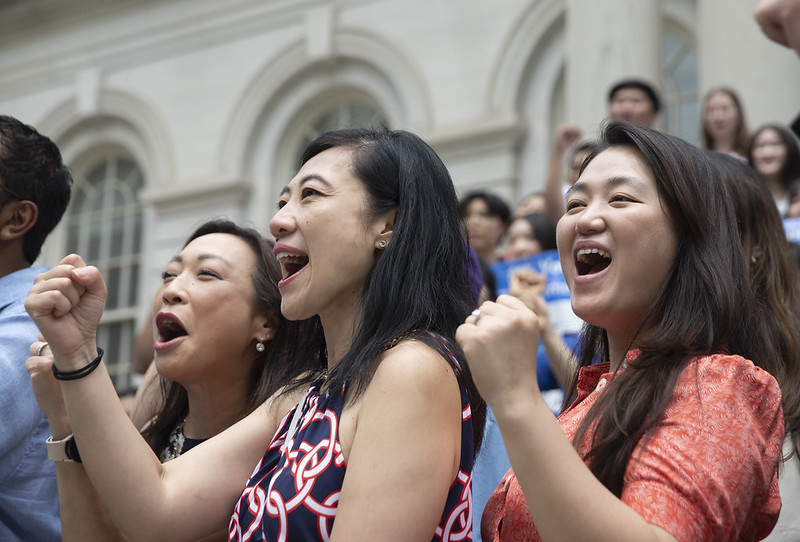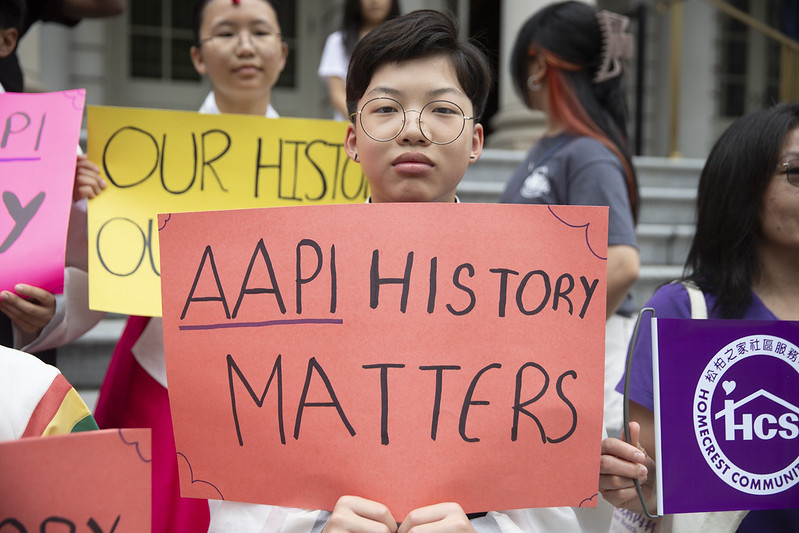Jul. 3, 2025 By Shane O’Brien
Queens Council Members Shekar Krishnan, Linda Lee, Sandra Ung and Julie Won gathered on the steps of City Hall Wednesday afternoon alongside Manhattan Council Member Carlina Rivera to celebrate the “historic” $2.5 million budget investment to support the implementation of Asian American and Pacific Islander (AAPI) history curriculum in NYC schools.
The elected officials were joined by representatives from a number of AAPI and immigrant groups on the steps of City Hall, including the Chinese American Planning Council, Korean Community Services, South Asian Youth Action (SAYA), Asian American / Asian Research Institute (AAARI), Asian American Education Project (AAEP).

Credit John McCarten/NYC Council Media Unit
Advocates celebrated the inclusion of the Education Equity Action Plan in the recently-passed FY2026 budget, which allocates $2.5 million to advance the AAPI studies curriculum in public schools across the city. The City Council voted unanimously to approve the $116 billion budget Monday.
A number of elected officials celebrated the inclusion of the Education Equity Action Plan in the budget, including Krishnan, who described the measure as an “important step” in ensuring all history is “taught in our classrooms.”
“I understand firsthand the importance of this curriculum,” Krishnan stated, adding that the budget also delivered “big wins” for families, schools and immigrant communities by providing funding for expanded services in city libraries alongside funding for a “historic” universal child care pilot program.
Won, meanwhile, said the AAPI curriculum represents a “meaningful step” toward enriching public school education in New York City.
“This initiative will supplement the existing Black and Latino studies curricula, offering students a more inclusive and accurate understanding of our city’s rich and diverse history. Every child deserves to learn about the communities that have shaped New York City, and how our histories are deeply connected,” Won said in a statement.
Ung said AAPI history is often overlooked in US history classes and said the investment will help ensure students have a deeper understanding of American history.

Credit John McCarten/NYC Council Media Unit
“The rich and complex history of the Asian American community is often overlooked when we discuss United States history. This funding is about helping students from all backgrounds develop a deeper understanding of their classmates, their neighbors, and the diverse city they live in,” Ung stated.
Lee noted that over 1.2 million members of the AAPI community call New York City home and said funding a new curriculum pays tribute to the “vital contributions” that the AAPI community makes to the city.
“As one of the first Korean Americans to serve on the Council, I’m proud to join my colleagues in securing $2.5 million in the city budget to support the development of an AAPI curriculum in our schools,” Lee said in a statement. “By introducing AAPI studies, we’re fostering a more inclusive and enriching educational environment.”
John Chin, interim dean at AAARI, said the funding will help the city’s education reflect the diversity of New York City. Chin said AAARI has partnered with the Asian American Education Project to help bring the the new curriculum into classrooms across the city through teacher training and student-led storytelling.
“With dedicated support for teacher training and student-led storytelling, we’re building a model that centers local communities and gives students a voice,” Chin said in a statement.

Credit John McCarten/NYC Council Media Unit
Council Speaker Adrienne Adams, meanwhile, said in a statement that will ensure that students across the city see themselves reflected in their studies.
“Building on the success of the Black Studies and Latine Studies curricula, the Council is proud to invest $2.5 million in the city budget to develop and promote an AAPI curriculum,” Adams said. “These educational materials, advanced in partnership with our community partners, will ensure our scholars see themselves reflected in their education, and that our educators are equipped with the tools to teach AAPI history.”